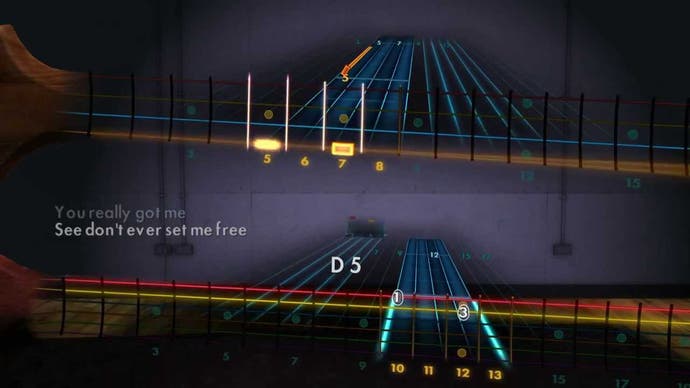Games of 2013: Rocksmith 2014
Synchronicity.
Earlier this month I celebrated the 30th anniversary of my first published article - tips for Atari's Pole Position coin-op that I wrote as a teen for Computer and Video Games magazine. I still remember the impact that game had on me the first time I sat inside its cabinet. Today it looks comically blocky, sounds like an angry hornet, and handles like a series of multiple-choice questions - but in 1983, my imagination anti-aliased its chunky pixels, conjured F1 music from its furious buzzing, and fooled me into believing I really was driving a racing car at 200mph. It made my heart pound and I left the machine almost breathless.
Laugh all you like, but that was a magical video gaming moment for me. Something that I believe happens to all of us, when time, space, and game come together to create a memory so special, your subconscious instinctively kicks in and records it in super high definition so you can savour it for the rest of your life.
Over the years I've had other moments like that, such as the first time I encountered Super Mario Bros. and inadvertently disappeared down a pipe and discovered there was a secret world beneath it. The indescribable feeling of my mind blowing will forever be with me. Or when I realised I could - and did - walk all the way to the top of that mountain I could see in the distance of the first MMO I logged into. Once it happened when I wasn't even playing - when I saw Gran Turismo for the first time, realised what I was looking at, and immediately wanted it more than any other game I'd seen before. To me, it's instances like these that define my favourite pastime.
This year, I've had three. Although Bioshock Infinite was essentially a strung-together series of shooting galleries, the conclusion of its absolutely terrific storyline provided the first. My long-overdue playthrough of the abstract, yet emotionally stirring Journey resulted in the second. The third, and most memorable one, occurred when my girlfriend and I were playing multiplayer Rocksmith 2014 one evening.

Ever since I was a kid, I've wanted to play guitar. When she found this out, my dear old nan gave me a beaten up acoustic guitar she'd picked up at a jumble sale, along with a dog-eared copy of Bert Weedon's “Play in a Day” that was so old it had a five-shilling price tag on the cover. I dutifully plucked away, but just didn't have the patience or talent to make it beyond the first few pages.
Decades later, reviewing Rocksmith 2014 gave me an excuse to try again. I spent weeks using Ubisoft's learning tool, and was delighted to discover that it really was capable of turning my boyhood dream into reality. My musician girlfriend also tried it out and ended up participating in my review on USGamer, providing expert views to contrast my novice noodlings.
One of my key motivators to learn this time around was a desire to be able to play music with my partner. We've talked about doing that for years, but despite trying with synths, samplers, and even my DJ set-up, it just hasn't panned out. I'm not musically minded at all, and she's classically trained; it's like the chimp meeting the monolith at the beginning of 2001: A Space Odyssey. The closest thing we've got to it is playing Rock Band. Fun for sure, but that's not music - it's a game.
We both continued to use Rocksmith post-review. My girlfriend learned bass guitar a few months ago (sickeningly quickly I hasten to add), and used it to practice her technique, while I continued to develop my fledgling guitar-playing skills. However, since we often wanted to practice at the same time, I thought it would be a good idea to buy a second cable so that we could do so together using Rocksmith's multiplayer mode.
That evening, we gave it a go. We opened with The Cure's “Just Like Heaven,” a simple song that we both know well. As we practiced and I improved, Rocksmith's auto-difficulty upped the ante to the point where I was playing a rudimentary version of the lead guitar line. Meanwhile, my girlfriend was banging out the full bassline like a pro in the game's “master mode”. We were still poles apart musically, but as we played through the song and reached its conclusion, we exchanged glances and both realised we'd finally made that musical connection we'd been looking for. We'd both just played a song together - facilitated by technology for sure - but we were playing together, with real musical instruments, playing real notes, and it felt great. That moment became one of my most enduring of this year.
Whether or not we were actually playing a game is arguable, but the way Rocksmith 2014 gamifies learning guitar certainly makes it feel like one. Either way, it's a bona fide learning tool - and an impressive one at that. It's capable of teaching an absolute novice like me to play, but also has enough of a top end to be useful to someone who can play really well. Its real magic, though, is that either by accident or design, it enables two people of disparate musical talents to learn together, play along with one another, and feel great about it. Whether it's parent and child, partners, or just friends - that's really quite remarkable.











